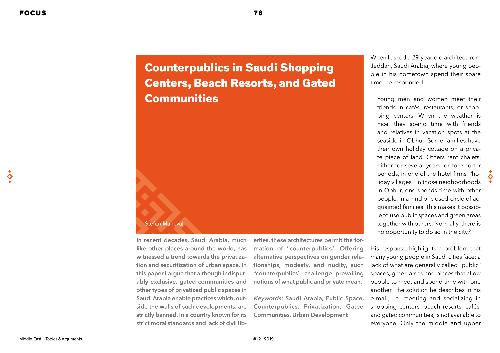Counterpublics in Saudi Shopping Centres, Beach Resorts, and Gated Communities
In recent decades, Saudi Arabia, much like other places around the world, has witnessed a trend towards the privatization and securitization of urban space. In this paper I argue that although indisputably exclusive, gated communities and other types of privatized public spaces in Saudi Arabia enabl...
I tiakina i:
| I whakaputaina i: | Middle East - Topics & Arguments |
|---|---|
| Kaituhi matua: | |
| Hōputu: | Artikel (Zeitschrift) |
| Reo: | Ingarihi |
| I whakaputaina: |
Philipps-Universität Marburg
2019
|
| Ngā marau: | |
| Urunga tuihono: | Urunga tuihono |
| Ngā Tūtohu: |
Kāore He Tūtohu, Me noho koe te mea tuatahi ki te tūtohu i tēnei pūkete!
|
| Whakarāpopototanga: | In recent decades, Saudi Arabia, much like other places around the world, has witnessed a trend towards the privatization and securitization of urban space. In this paper I argue that although indisputably exclusive, gated communities and other types of privatized public spaces in Saudi Arabia enable practices which, outside the walls of such developments, are strictly banned. In a country known for its strict moral standards and lack of civil liberties, these architectures permit the formation of “counterpublics.” Offering alternative perspectives on gender relationships, modesty, and nudity, such “counterpublics” challenge prevailing notions of what public and private mean. |
|---|---|
| DOI: | 10.17192/meta.2019.12.7930 |
